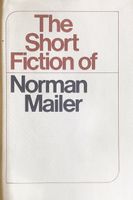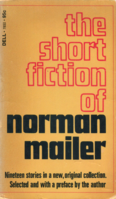67.11: Difference between revisions
m Added original cover. |
m Fixed caption. |
||
| Line 12: | Line 12: | ||
|height=200 | |height=200 | ||
|align=left | |align=left | ||
|File:67-11-orig.jpg| | |File:67-11-orig.jpg|Howard Fertig hard cover edition, 1980. | ||
|File:67-11.png|Paperback. | |File:67-11.png|Paperback. | ||
}} | }} | ||
Revision as of 09:21, 16 October 2020
The Short Fiction of Norman Mailer. New York: Dell, 11 May, soft-cover; Sevenoaks, Kent: New English Library, August 1982. Short stories, 285 pp., 95¢.
The British edition combines 67.11 with Existential Errands (72.7) under the title The Essential Mailer (82.19). Nineteen previously published stories with an original introduction (later reprinted in 72.7 and 82.19). No dedication. Original title: “Hunger for Method, Greed for Gold.” Rpt: Accompanied by separate editions of Barbary Shore (51.1) and The Deer Park (55.4), The Short Fiction of Norman Mailer (80.23) appeared in a hardcover edition (the first) in 1980. New York: Howard Fertig.
18 stories — all expect “The Shortest Novel of Them All” — appeared previously in one or another of Mailer’s miscellanies (59.13, 63.37, 66.11); 13 of the stories appeared in periodicals or other collections prior to being reprinted in one of the miscellanies. “The Man Who Studied Yoga” and “The Time of Her Time” were reprinted in 98.7. Shohakusha (Tokyo) published A Selection from the Short Fiction of Norman Mailer (68.32). See 74.19.
| “ | It has been remarked that the short fiction of this author is neither splendid, unforgettable, nor distinguished, and I hasten hereby to join such consensus…. He does not have the gift to write great short stories, or perhaps even very good ones. In fact, he will confess he does not have the interest, the respect, or the proper awe. The short story bores him a little. He will admit he rarely reads them. He is, in secret, not fond of writers who work at short stories. Nor are they often, he suspects, fond of him. He has a private sneer for the reputations they have amassed. There is a terrible confession to make: he thinks the short story is relatively easy to write. | ” |
| — Mailer, 67.11 | ||





